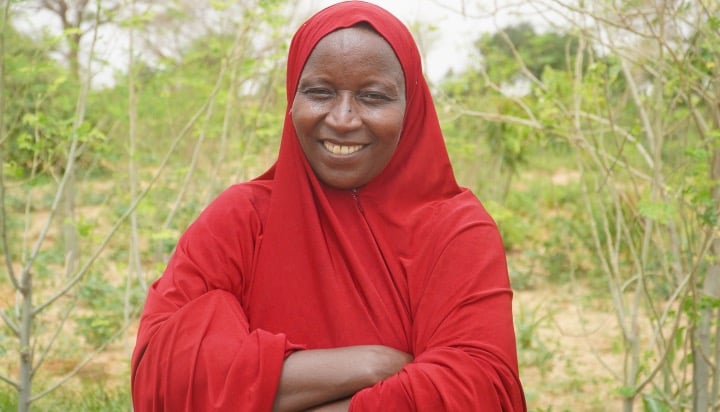Few things in life are certain, but one thing I have come to realize is that women in crisis always do surprising things, with or without outside intervention.
As we present the latest results of our Women's Response survey, a large-scale listening effort with thousands of women from Village Savings and Loan Associations (VSLAs), another truth becomes clear: it's important to always listen to women's voices. And by women's voice, I don't mean baseline and endline surveys and checking a few boxes along the way. We need to be in constant conversation with women, supporting their leadership, and co-creating solutions that contribute to a sustainable impact.
Women Respond began as an effort to hear how COVID-19 has affected women's lives and how they are responding during the pandemic. But since then, we have seen a rapid rise in crises that affect women the most. Armed conflict, droughts, floods, pest infestations. The list goes on. Despite these rising crises, this latest research shows an overall decline in support for women – from the aid sector, donors and governments. This is supported by UN data showing that the gap between funding requirements and resources now stands at $43 billion, the highest ever. [UNOCHA, 2023]
Women have always been the glue that holds communities together and underpins coordinated responses to their immediate needs. Yet women bear a heavy burden and receive limited recognition and support in their lives. It's clear that women's voices are missing from decision-making tables. They are both the most affected and the least prioritized. This is why Women Respond is such an important initiative. CARE is one of the few organizations that regularly elevates women's voices, responds to women's needs, and addresses women's priorities.
By truly listening to women’s voices, we are beginning to change how we view them. Women are not passive recipients of aid, but essential participants in the early recovery of their homes and communities in crisis. VSLA women consistently show support to members and non-members, allocating personal resources to meet the most pressing needs of members and communities. We found that VSLA groups in all countries use social funds to financially support members and buy food. This latest survey shows that women are diversifying their income sources (52%), exercising and volunteering together (40%), and using their savings to feed their families (41%). But women are also being forced to adopt coping mechanisms that negatively impact them, such as eating less and selling assets.
Women told us that the deterioration of their livelihoods, food, school and safety for their children are major stressors, especially in conflict-affected areas. Often these stressors lead to tensions and domestic violence. As a result, there is little support for victims of gender-based violence or mental health support, and health centres are barely able to provide basic services.
Women also tell us that rising prices, mainly food-related, are contributing to household poverty. This limits their ability to save – a vital safety net for future needs. We find that women are not asking for assistance in response to worsening household incomes. They are looking for practical solutions to improve their lives, such as access to finance, improved agricultural processes and water infrastructure.
While aid for women is declining, we also know that women are not passively waiting for humanitarian assistance. They are taking action. In Niger, Mariama, Executive Director of VSLA, told us how her group came together to develop community gardens, improving income, food and nutrition for all its members. In Ethiopia, Zenanesh explains how her group is working to prevent forced marriage and female genital mutilation in her community.
For the first time, we added a question asking what women want CARE to do for them from government officials. At the top of the advocacy agenda in all seven countries is getting governments to act on food security. As women report that their income is essential to their family's survival, income-generating opportunities are the second-highest priority for action at scale. CARE's advocacy team is already focused on these two areas to influence the U.S. government, global donors, and national governments.
CARE now incorporates Women Respond into its regular monitoring of VSLAs, proactively responding to women and deploying the support they want and need. It also goes a step further by giving the data back to the women so they can use it to support their own actions. The women present the data to key people in their communities, appearing on local radio and attending meetings with local authorities. In this way, they are reinforcing their needs as well as the great things they are doing to change their communities for the better. This is advocacy at its finest.
Increasing the role and visibility of women in crisis will ultimately help the development community better understand their roles, needs, and priorities, as well as VSLA's role in building the long-term resilience of their households and communities. If you are actively collecting data from women, please share it with us, even if it is incomplete. Crises require rapid responses. The power of our collective data is already transforming people's lives.
Humanitarian and development programmes and their funding need to be flexible. Resources need to be shifted to address women's specific needs, with a strong focus on women's voices. So my message to my colleagues in the sector and the generous donors who support our work is clear:
Stop talking and start listening.
Please see the most recent Women (VSLA Affiliated) Response Survey here.
Business and Poverty Equality Summit: Join us for a two-day Global Equity Summit to understand the changing business and equity landscape and develop strategies to address modern challenges. We will delve into critical issues such as women's entrepreneurship, health, gender-based violence, sustainable infrastructure, value chains, and youth empowerment. Sign up for free using promo code GES24BFP.

